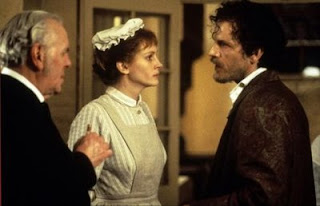 Haynes's film on Bob Dylan is more an impressionistic portrait than a biopic. As such, it requires the viewer to buy into the director's assertion that Dylan is too elusive and multi-faceted as a persona to be presented as simply a single character. Without following Haynes on this, digesting six different actors representing phases in the troubadour's life, under even more aliases, is hard work.
Haynes's film on Bob Dylan is more an impressionistic portrait than a biopic. As such, it requires the viewer to buy into the director's assertion that Dylan is too elusive and multi-faceted as a persona to be presented as simply a single character. Without following Haynes on this, digesting six different actors representing phases in the troubadour's life, under even more aliases, is hard work.The heavy use of Dylan's songs throughout facilitates this accommodation a great deal: rarely does a soundtrack support the actual structure of the film in this way. The lyrics, working in juxtaposition with contemporary newsreel footage, constantly send trains of thought down new tracks, which in turn justifies the sudden leaps in scene or characterisation. This mostly works to good effect, until a gnawing feeling arises that nothing except Vietnam and civil rights marches actually took place in the whole era covered.
As for the performances, the stand-out one is, predictably, Cate Blanchett's much-vaunted turn as the snotty '65-'66 period Dylan, all jittery railing at convention, and just about staying on the right side of parody, probably because that Dylan was the closest to a parody anyway.
Overall, an honourable stab at breathing new life into a subject in danger of becoming fossilised by popular veneration.
7/10












